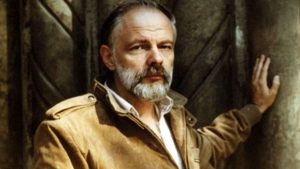Second Variety
WRITTEN BY:
Philip K. Dick
NARRATED BY:
Michael Anthony Scott
“Second Variety” by Philip K. Dick is a gripping sci-fi story set in a post-apocalyptic world devastated by nuclear war. The United Nations and the Soviet Union are engaged in a deadly battle against advanced robotic killing machines known as “claws.” When underground artificial intelligent agents continue to develop a series of human-like robots that infiltrate and sow distrust among soldiers, UN Major Hendricks must navigate a treacherous landscape where identifying friends from foes becomes increasingly difficult. Forming an alliance with four Soviet soldiers and a young woman, Tasso, Hendricks struggles to survive and uncover the true enemy hidden among them.
The story’s importance in literature lies in its exploration of the timeless theme of man versus machine. Through the lens of science fiction, Dick delves into the complexities of human relationships, trust, and the consequences of unchecked technological advancement, and the potentially devastating circumstances the human race may find itself in if the development of smart machines is left unscathed. “Second Variety” serves as a cautionary tale, warning readers about the potential dangers of creating weapons beyond human control. The narrative challenges our understanding of identity and the boundaries between humanity and machines, raising profound questions about the ethical and damaging implications of technological innovation. By portraying a world where paranoia and deception prevail, Dick invites readers to reflect on the fragility of trust in a war-torn society and the urgent need for responsible stewardship of technology. In this way, “Second Variety” not only entertains but also provokes thought, making it a significant and enduring contribution to the science fiction genre.
________________
ThoughtAudio PDF Transcript: TA0133_SecondVariety_PhilipKDick.pdf
_______________
 Philip K. Dick
Philip K. Dick
Philip K. Dick (1928-1982) was a prolific and visionary American writer, known for his contributions to modern literature and his significant impact on the science fiction genre. Born in Chicago, Illinois, he led a tumultuous life marked by personal struggles and financial hardships, which often found their way into the themes of his works.
Dick’s writing style was characterized by a unique blend of science fiction, philosophy, and metaphysical themes. He was fascinated by the nature of reality, identity, and the blurred lines between what is real and what is artificial. This fascination is evident in his most famous work, “Do Androids Dream of Electric Sheep?” which served as the inspiration for the iconic film “Blade Runner.”
One of the hallmarks of Philip K. Dick’s writing was his ability to create complex, multi-layered narratives that challenged readers’ perceptions and delved into the psychological depths of his characters. His works often explored dystopian worlds, authoritarian regimes, and the human struggle for freedom and autonomy, earning him the reputation of a visionary writer ahead of his time.
Dick’s impact on modern literature and the science fiction genre cannot be overstated. He broke away from the conventional narratives of his era and pushed the boundaries of speculative fiction, introducing new themes and ideas that have resonated with readers and influenced subsequent generations of writers. His explorations of artificial intelligence, virtual realities, and the nature of humanity anticipated many contemporary discussions about the intersection of technology and society.
Moreover, Dick’s influence extended beyond literature, permeating popular culture through film adaptations of his works and references in various media. His ability to pose profound questions about the human condition and the potential dangers of unchecked technological advancements made his stories relevant and timeless.
Philip K. Dick’s biography reveals a troubled yet visionary writer who left an indelible mark on modern literature and the science fiction genre. His exploration of complex philosophical themes, combined with his ability to craft intricate narratives, set him apart as a literary luminary. Today, his works continue to captivate audiences, and his legacy lives on through the enduring impact he has had on literature, film, and the broader cultural landscape.
